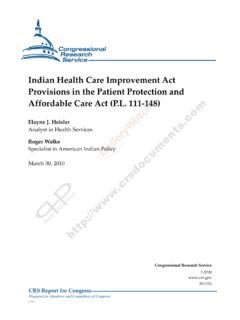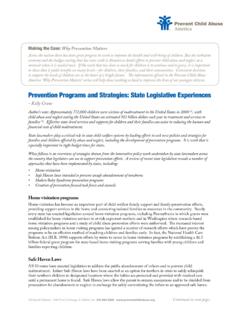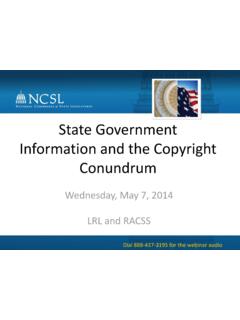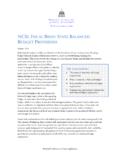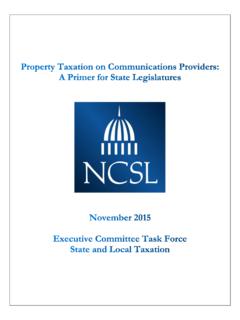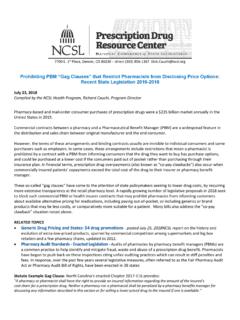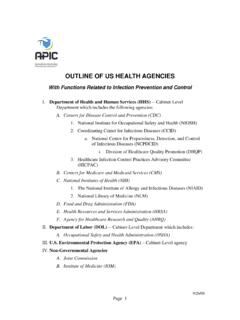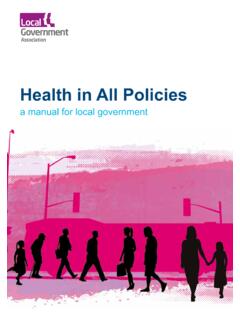Transcription of Health Care: Constitutional Rights and Legislative Powers
1 CRS Report for CongressPrepared for Members and Committees of Congress Health Care: Constitutional Rights and Legislative Powers Kathleen S. Swendiman Legislative Attorney April 5, 2010 Congressional Research Service7-5700 R40846 .c11173008 Health Care: Constitutional Rights and Legislative Powers Congressional Research Service Summary The Health care reform debate raises many complex issues including those of coverage, accessibility, cost, accountability, and quality of Health care. Underlying these policy considerations are issues regarding the status of Health care as a Constitutional or legal right. This report analyzes Constitutional and legal issues pertaining to a right to Health care, as well as the power of Congress to enact and fund Health care programs. Following the recent passage of the Patient Protection and Affordable Care Act, 111-148, legal issues have been raised regarding the power of Congress to mandate that individuals purchase Health insurance, and the ability of states to nullify or opt out of such a requirement.
2 These issues are also discussed. The United States Constitution does not set forth an explicit right to Health care. While the Supreme Court would likely find that the Constitution provides a right to obtain Health care services at one s own expense from willing providers, the Supreme Court has never interpreted the Constitution as guaranteeing a right to Health care services from the government for those who cannot afford it. The Supreme Court has, however, held that the government has an obligation to provide medical care in certain limited circumstances, such as for prisoners. While the United States Constitution and Supreme Court interpretations do not identify a Constitutional right to Health care for those who cannot afford it, Congress has enacted numerous statutes, such as Medicare, Medicaid, and the Children s Health Insurance Program, that establish and define specific statutory Rights of individuals to receive Health care services from the government.
3 As a major component of many Health care entitlement statutes, Congress has provided funding to pay for the Health services provided under law. Most of these statutes have been enacted pursuant to Congress s authority to make all Laws which shall be necessary and proper to carry out its mandate to .. provide for the .. general Welfare. The power to spend for the general welfare is one of the broadest grants of authority to Congress in the Constitution. The Supreme Court accords considerable deference to a Legislative decision by Congress that a particular Health care spending program provides for the general welfare. Recently, Congress enacted comprehensive Health care reform legislation, 111-148, which includes a requirement that individuals purchase Health insurance. Several lawsuits have been filed challenging the power of Congress to enact such a mandate under the Commerce Clause of the Constitution.
4 In addition, several states have passed laws attempting to nullify or opt out of the federal individual Health insurance mandate in Section 1501 of 111-148, which goes into effect in 2014. Direct conflicts between federal and state laws would raise Constitutional issues which are likely to be resolved in favor of the federal law under the Supremacy Clause of the Constitution. A number of state constitutions contain provisions relating to Health and the provision of Health care services. State constitutions may provide Constitutional Rights that are more expansive than those found under the federal Constitution since federal Rights set the minimum standards for the states.. Health Care: Constitutional Rights and Legislative Powers Congressional Research Service Contents Health Care Rights Under the Constitution .. 1 Explicit Rights in the Constitution.
5 1 The Right to Health Care at the Government s 2 Substantive Due Process: Impact on Fundamental Rights .. 2 Equal Protection: Wealth as a Suspect Class .. 4 Exception: Under Government Control .. 5 Federal Power to Provide for and Fund Health Care 6 The Taxing and Spending Power .. 7 Federally Funded Health Care 8 The Individual Mandate to Purchase Health Insurance Under the Patient Protection and Affordable Care 9 Lawsuits Challenging the Constitutionality of the Individual Health Insurance 10 State Attempts to Nullify or Opt Out of Federal Health Care Reform Requirements .. 11 State Constitutions and the Provision of Health Care Services .. 12 Contacts Author Contact Information ..13 . Health Care: Constitutional Rights and Legislative Powers Congressional Research Service 1 Health Care Rights Under the Constitution The Health care reform debate raises many complex issues including those of coverage, accessibility, cost, accountability, and quality of Health care.
6 Underlying these policy considerations are issues regarding the status of Health or Health care as a moral, legal, or Constitutional right. It may be useful to distinguish between a right to Health and a right to Health An often cited definition of Health from the World Health Organization describes Health as a state of complete physical, mental and social wellbeing and not merely the absence of disease or infirmity. 2 Health care connotes the means for the achievement of Health , as in the care, services or supplies related to the Health of an individual. 3 For purposes of this report, discussion will be limited to Constitutional and legal issues pertaining to a right to Health care. Numerous questions arise concerning the parameters of a right to Health care. If each individual has a right to Health care, how much care does a person have a right to and from whom?
7 Would equality of access be a component of such a right? Do federal or state governments have a duty to provide Health care services to the large numbers of medically uninsured persons? What kind of Health care system would fulfill a duty to provide Health care? How should this duty be enforced? The debate on these and other questions may be informed by a summary of the scope of the right to Health care, particularly the right to access Health care paid for by the government, under the Constitution and interpretations of the Supreme Explicit Rights in the Constitution The United States Constitution does not explicitly address a right to Health care. The words Health or medical care do not appear anywhere in the text of the Constitution. The provisions in the Constitution indicate that the framers were somewhat more concerned with guaranteeing freedom from government, rather than with providing for specific Rights to governmental services such as for Health care.
8 The right to a jury trial, the writ of habeas corpus, protection for contracts, and protection against ex post facto laws were among the few individual Rights explicitly set forth in the original In 1791, the Bill of Rights was added to the Constitution, and additional amendments were added following the Civil War, and thereafter. Most Constitutional amendments dealt with civil and political Rights , not social and economic However, there have been proposals to add a specific right to Health care as an amendment to the 1 See Lawrence O. Gostin, Securing Health or Just Health Care? The Effect of the Health Care System on the Health of America, 39 St. Louis U. 7 (1994), and Lawrence O. Gostin, The Right to Health : A Right to the Highest Attainable Standard of Health , 31 HASTINGS CENTER REPORT 29-10 (2001).
9 2 Constitution of the World Health Organization (2006), available at 3 Health Insurance Portability and Accountability Act (HIPAA) Privacy Rule, 45 4 This report does not analyze the scope of a right to Health or Health care under various international agreements or under the governing documents of other countries. For further information see, , Puneet K. Sandhu, A Legal Right to Health Care: What Can the United States Learn From Foreign Models of Health Rights Jurisprudence? 95 Cal. L. Rev. 1151 (2007); and Marcela X. Berdion, The Right to Health Care in the United States: Local Answers to Global Responsibilities, 60 SMU Law Review 1633 (2007). 5 W. Kent Davis, Answering Justice Ginsburg s Charge that the Constitution is Skimpy in Comparison to our International Neighbors: A Comparison of Fundamental Rights in American and Foreign Law, 39 S.
10 Tex. L. Rev. 951, 958 (1998). 6 Id. at 958-959.. Health Care: Constitutional Rights and Legislative Powers Congressional Research Service 2 Constitution. For example, in 1944, President Franklin D. Roosevelt, in his State of the Union address, advanced his idea of a Second Bill of Rights which would include [t]he right to adequate medical care and the opportunity to achieve and enjoy good Health . 7 More recently, Representative Jesse L. Jackson Jr. introduced 30 on March 3, 2009, a bill which proposes an amendment to the Constitution ensuring a right to Health care. The proposed amendment reads, Section 1. All persons shall enjoy the right to Health care of equal high quality. Section 2. The Congress shall have power to enforce and implement this article by appropriate legislation. The Right to Health Care at the Government s Expense Even though the Constitution does not explicitly set forth a right to Health care, the Supreme Court s decisions in the areas of the right to privacy and bodily integrity suggest the Constitution implicitly provides an individual the right to access Health care services at one s own expense from willing medical However, issues regarding access to Health care do not usually concern access where a person has the means and ability to pay for Health care, but rather involve situations where a person cannot afford to pay for Health care.
